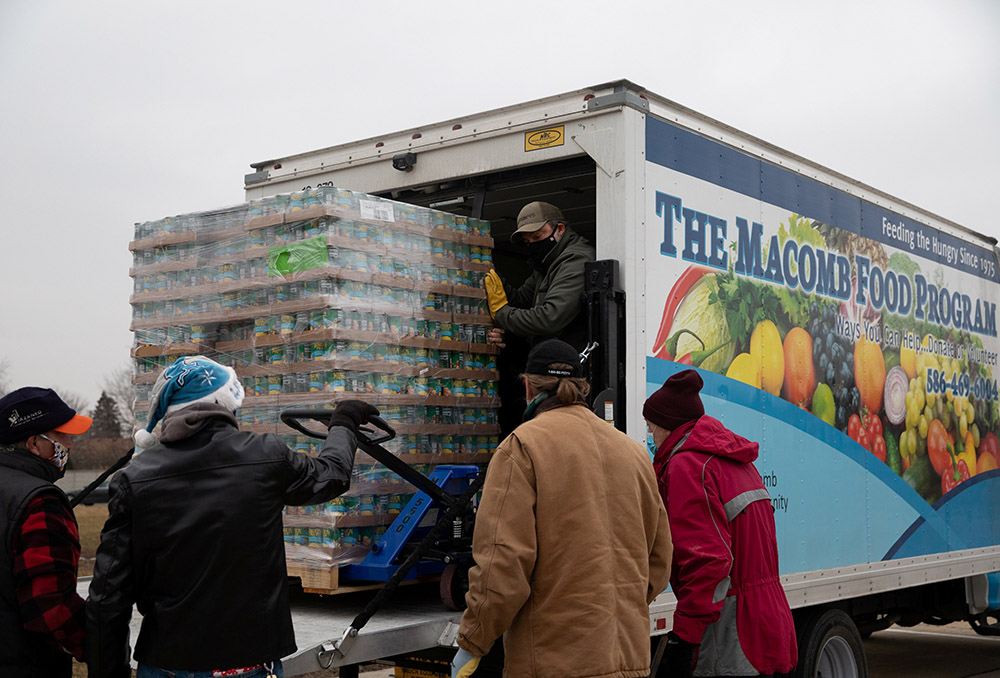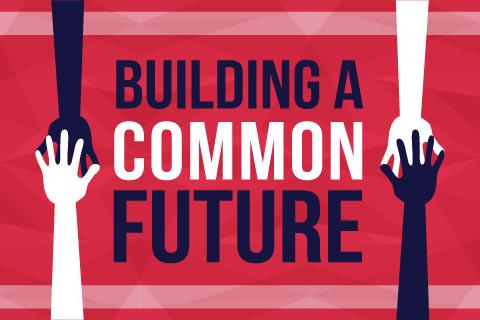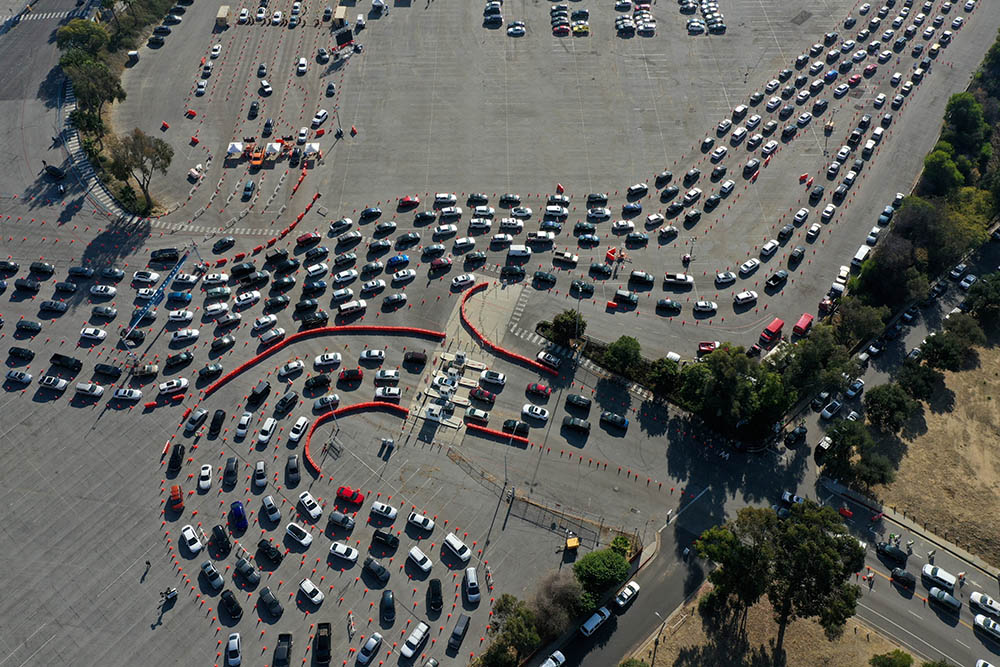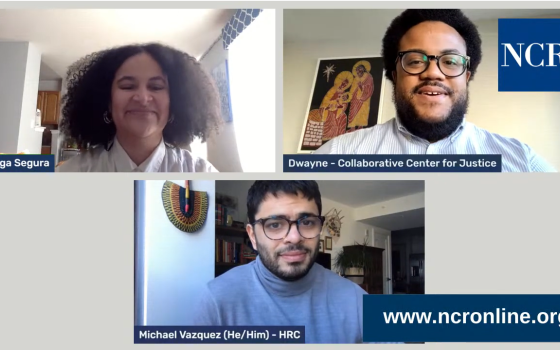
Volunteers from Forgotten Harvest food bank in Warren, Michigan, unload goods before a mobile food pantry distribution Dec. 21, 2020, amid the coronavirus pandemic. (CNS/Reuters/Emily Elconin)

(NCR graphic/Toni-Ann Ortiz)
Editor's note: In the weeks preceding the inauguration of the country's second Catholic president, the National Catholic Reporter asked other Catholic politicians, activists and scholars to offer advice to President-elect Joe Biden in a series that takes its title from Pope Francis' encyclical Fratelli Tutti: "Building a Common Future."
The widening wealth gap in the United States is inextricably linked to economic, social and racial injustice. We are a nation of people from all corners of the globe with varied backgrounds, identities and values — but also comprising the unfortunate spectrums of inequality in every enclave of this nation. The challenges President-elect Joe Biden will face are no exception.
Like myself, a Catholic committed to fighting injustice, and well-versed in the church's preferential option for the poor and vulnerable, our president-elect is governed by a deep responsibility to help those who are suffering and create a government that works for the common good. As a daughter of Italian Catholic immigrants, I am delighted to have a president-elect informed by these values.
Both my parents cherished the connection between public service and faith when they were elected to local government. They tended to their faith and community with humility and commitment to service.
I witnessed my father trudge through rain and snow to every house and apartment in our ward. He talked some but mainly listened. He wanted to know what our community needed and kept notecards — red for Republicans, blue for Democrats. It was too important not to miss anyone. Similarly, my mother served as an "alderwoman" for 35 years, one of the longest to date. Much of her work overlapped with St. Michael's Church in New Haven, Connecticut, advocating for the countless social justice missions she embraced.
Their memory and example inform my work in the Congress and inspire the fights I take on for the people.
The pandemic has further revealed the need to honor their legacy by working harder than ever to close existing gaps and address inequality. To this end, I believe we must provide comprehensive and affordable health care, expand opportunities for our children, and work to alleviate hunger. These are the cornerstones of taking on economic, social and racial justice as demanded by Catholic social teaching. Now more than ever.
The world is facing the biggest public health crisis in a century. COVID-19 has taken well over 300,000 lives in the United States and almost 2 million worldwide. The most recent data from the Centers for Disease Control and Prevention reports that minority and marginalized communities are disproportionately affected by the disease.

People in Los Angeles line up in their vehicles at Dodger Stadium for the COVID-19 test Jan. 4. (CNS/Reuters/Lucy Nicholson)
Amid social upheaval, we can hear the chants for justice and the cries for equality. Going back to our pre-pandemic days is not good enough. Together, we must make the changes necessary to close the wealth gap that existed long before this pandemic.
I was chair of the U.S. House of Representatives' Labor, Health and Human Services Subcommittee last year, and we were at the center of responding to COVID-19, appropriating $280 billion for education, health and working people. That included providing crucial funds for public health infrastructure, personal protective equipment, increased testing and vaccine development; and helping K-12 schools, colleges and universities deal with the shutdown, by providing funding in the CARES Act and ensuring the equitable distribution of the relief funds by the Education Department. Despite these efforts, the lack of a coordinated national response proved to be a logistical and legal nightmare.
Going forward, a few things must be done. We must ensure the entire population has access to consistent testing, personal protective equipment and cost-free vaccines. It is particularly critical that we ensure vulnerable individuals and communities are given additional support and attention to defeat the dual pandemics of COVID-19 and health inequality.
Containing the health crisis is only the first step in bridging the divide and eliminating social inequities. All Americans must have access to Medicare, and we must prioritize investments in women's health and biomedical research.
As a 30-year survivor of ovarian cancer, I know that early detection will save families from increased pain and financial burden. My ovarian cancer was detected in its earliest stages, purely by chance. I received excellent care and know that I am here today because of the grace of God, my access to quality health care and the power of biomedical research. No man, woman, or child should ever have to rely on luck when it comes to their health or well-being.
We have a responsibility to end child poverty in the United States of America, and we know how to do this. Experts at the National Academies of Sciences found that of all policies it recommended to cut child poverty, the most effective option was the implementation of a Child Tax Credit. Since 2003, I have fought to expand and improve the Child Tax Credit. While most children get the full credit, one-third of all children are left behind, because their families earn too little to get the full credit, disproportionately affecting families with young children, rural families, families headed by women, and one-half of all Black and Hispanic children.
By making the Child Tax Credit fully refundable, my American Family Act essentially creates a child allowance that would cut child poverty by two-fifths and end $2-a-day poverty for families with children. And this data predates the pandemic, which has accelerated the rates of poverty around the country. This poverty reduction achieved by the American Family Act is associated with better health, increased learning and higher lifetime earnings. We all want to do right by our children, and I am committed to making a child allowance a reality.
Advertisement
I also introduced the Child Care Is Essential Act, an emergency appropriations bill to provide $50 billion to immediately address the child care crisis and stabilize the sector by supporting providers, so they can safely reopen and run. In good times, these are small businesses that operate on razor-thin margins. Now, the COVID-19 pandemic has them facing financial ruin. Nearly half of child care programs could close. Without this significant public investment, child care closures will be concentrated in low-income and middle-income neighborhoods. The Biden-Harris administration must work with Congress to ensure our kids have quality and affordable child care.
Health care and child care are only part of the equation. The other two cornerstones include fighting food insecurity and ending the scourge of childhood hunger.
The Household Pulse Survey, launched by the Census Bureau in April, has provided real-time weekly data on how the pandemic is affecting our nation's families. According to this survey, hunger has skyrocketed during the pandemic: Nearly 26 million adults, nearly 12% of all adults in the country, reported that their households did not have enough food in the last week. And, even more concerning, households with children were almost twice as likely to experience food insecurity.
At the beginning of the pandemic, I introduced the Ensuring Emergency Food Security Act to increase the monthly food assistance benefit that families receive through the Supplemental Nutrition Assistance Program (SNAP), formerly the Food Stamp Program. SNAP is our nation's most effective anti-hunger program, but on average only amounts to about $1.40 per person per meal. That is simply not enough in normal times, let alone a global pandemic.
I am grateful that in the most recent COVID-19 relief package bipartisan agreement was reached on this issue, allowing for a 15% increase in the monthly food stamp benefit.
To continue making progress, Congress and the incoming administration must change the conversation around personal responsibility and the common good and address the chasms that are being exacerbated by the pandemic. I have no doubt we can rise to this challenge.
Sixty years ago, during the election of the first Catholic president, the country was filled with optimism and energized to address the social ills of the time. Now with President-elect Biden, we have the same opportunity to advance a more just society, address inequality and ameliorate poverty.





